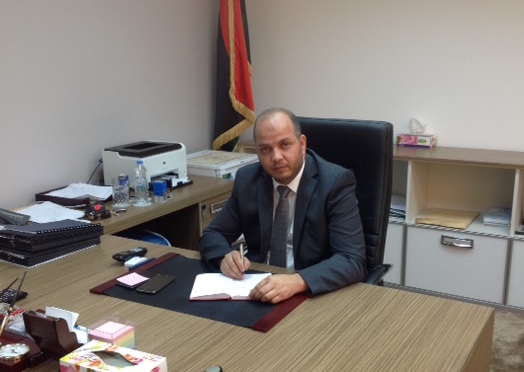By Moutaz Ali.
![Tripoli electricity minister Nuredin Ali Salem, the Minister of Electricity . . .[restrict]and Renewable Energy](https://www.libyaherald.com/wp-content/uploads/2015/08/Tripoli-electricity-minister.jpeg)
Tripoli, 5 August 2015:
Libya needs to produce almost 40 percent more electricity, Nuredin Ali Salem, the Minister of Electricity and Renewable Energy in the Tripoli government of Khalifa Ghwell has said. Speaking in an interview with the Libya Herald, he said that current output was 2,850 megawatts (MW) but that another 1,800 MW was needed to meet current demand. However, he held out little hope that the extra electricity would be produced until the country’s political problems were solved.
In a frank admission of the enormous electricity shortages facing the entire country, Salem yesterday put the problem down to the political conflict. It was not so much that fighting had stopped plants operating or that facilities had been damaged and electrical engineers were afraid to makes repairs, it was that foreign companies and workers that had been building or operating plants had left the country because of the situation.
“The main causes [for the problem] are the current circumstances of the country – the ongoing wars inside the country – plus the departure of the international companies which operate the generating stations”, he said.
Electricity production would have been far greater this year had the political crisis not blown up, Salem said. “There were many power generation projects that were supposed to come on stream during 2014 but which have now been delayed because international companies fled the country.”
The 525-MW power station in Khoms was a case in point, he noted. “The area is very safe, but the Turkish company left the station in March 2014 after Hafter issued his threat that all Turkish had to leave the country immediately. The company was supposed to complete the works and hand over the power plant in June 2014. Khoms station is up to 85-percent implemented and only needs two to three months of work to start producing power. But the Turks refuse to return.”
It is not a question of needing to plan for new generating stations, Salem said. Plans had already been made, contracts awarded, work undertaken and almost completed. But again it had stopped. “We have Obari power plant which is supposed to produce 640 MW; Sirte power plant, 1,400 MW, Zahra power plant, 235 MW; and Tripoli West, 1,400 MW.”
As a result of these unfinished projects, the two parts of the country suffering electricity shortages most at the moment were the greater Tripoli area and the south, he explained.
Both are experiencing lengthy outages daily, around half a day; in some districts even more. And without electricity, it is not just a matter of no air conditioning in the intense summer heat. The pumps for water do not work, nor does the internet or the mobile phone networks. But it is not just the Tripoli area and the south that are suffering. Parts of Benghazi have gone two or three days without electricity.
“If the international companies returned and accomplished their projects, the problem would be solved completely. And, believe or not, Libya would be able then to export electricity!” Salem stated.
The problem had been compounded, he pointed out, by the fact power plants need regular maintenance. “For example, gas units need overall maintenance each of 40,000 or 50,000 working hours. Again, this needs the cooperation of the international expertise – and most of them have left the country. We’ve lost many power plants because of this.”
To ease the immediate problem, there have been plans to import generators, Salim said, but it does not look as if it is going to work. “We suggested importing gas [powered] units in order to provide the electricity service to people in fast time because the international companies still refuse to return and resume their projects. Unfortunately the amount we have suggested is $1 billion and it it seemed a huge amount to some people. But it is not if we’re to provide immediate electricity supplies in as large a country as Libya,” he said.
As a result, “we as a ministry don’t have the funds for this”. [/restrict]







